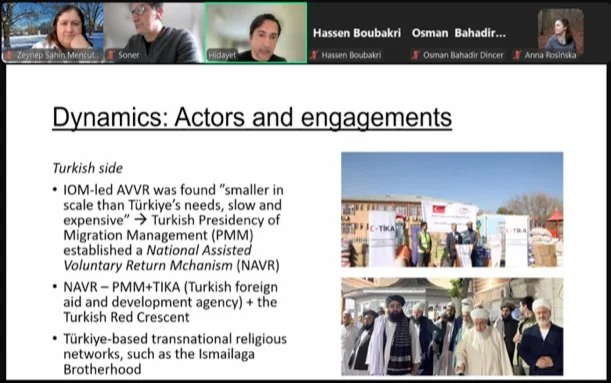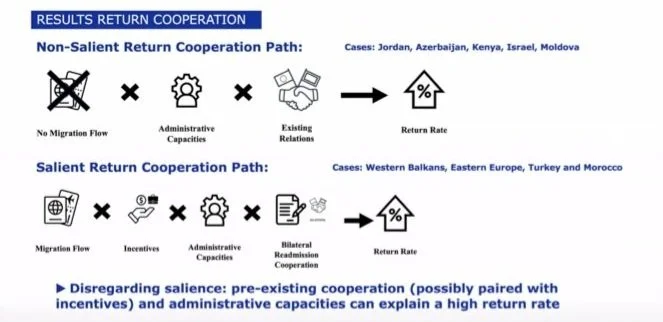GAPs Project Explores Return Diplomacy and Migration Governance in Virtual Workshop
January 21, 2025 – The GAPs project’s Work Package 5 (WP5) team convened a virtual workshop, bringing together leading scholars to examine the complex realities of return migration. The event underscored how return diplomacy functions beyond formal agreements and showcased the potential of Qualitative Comparative Analysis (QCA) as a methodological tool in migration research.
Rethinking Return Diplomacy: Beyond Formal Agreements
The first panel tackled the dynamics of return diplomacy, focusing on how states negotiate and implement return policies. Soner Barthoma and Hidayet Sıddıkoğlu analyzed migration governance between Turkey and Afghanistan, where the lack of a formal return agreement forces reliance on informal mechanisms. Their research highlighted the pivotal role of unofficial negotiations in shaping return policies.
Nora Stel and Maissam Nimer explored the EU’s involvement in Lebanon’s return diplomacy with Syria, emphasizing how Lebanon’s informal migration policies create a shadow framework for returns. Their work challenged conventional perspectives that focus solely on legal agreements, arguing for a more comprehensive understanding of return governance.
QCA: A New Lens for Migration Research
The second panel shifted focus to the methodological contributions of QCA. Gülce Şafak Özdemir presented her co-authored study with Asya Pisarevskaya on why some European cities are more inclusive toward irregular migrants. Their research, published in the Journal of Ethnic and Migration Studies, underscored the role of municipal activism in shaping migration policies at the local level.
Philip Stutz introduced his latest book on EU migration policy, which uses QCA to analyze the factors that lead to successful readmission agreements and forced return policies. His work expanded the discussion beyond bilateral negotiations, offering a comparative perspective on return cooperation between the EU and non-EU countries.
Decoding Return Politics Through QCA
The final panel brought together return diplomacy and QCA, presenting a systematic analysis of return agreements. WP5 researchers Gerasimos Tsourapas, Zeynep Şahin-Mencütek, and Samet Apaydın examined the conditions under which five EU member states—France, Germany, Greece, Poland, and Sweden—negotiated successful readmission agreements with non-EU countries. Their findings revealed that incentives, costs, and informal diplomacy play decisive roles in shaping return policies.
ECPR lecturer Seweryn Krupnik provided expert commentary, emphasizing how QCA can deepen migration research by identifying patterns across multiple cases. His feedback, along with participant discussions, refined the WP5 team’s empirical framework and broadened the debate on informality in return negotiations.
Key Insights: The Future of Return Migration Research
The workshop highlighted two critical takeaways: first, return diplomacy often operates outside legal agreements, making informal negotiations a crucial factor in migration governance. Second, QCA offers a powerful methodological tool to compare return policies across different contexts while preserving the complexity of real-world dynamics.
By fostering interdisciplinary dialogue, this workshop paves the way for future research on return diplomacy and migration policy. As return migration remains central to global migration debates, these discussions will shape a more nuanced understanding of how states manage returns and negotiate international cooperation.



